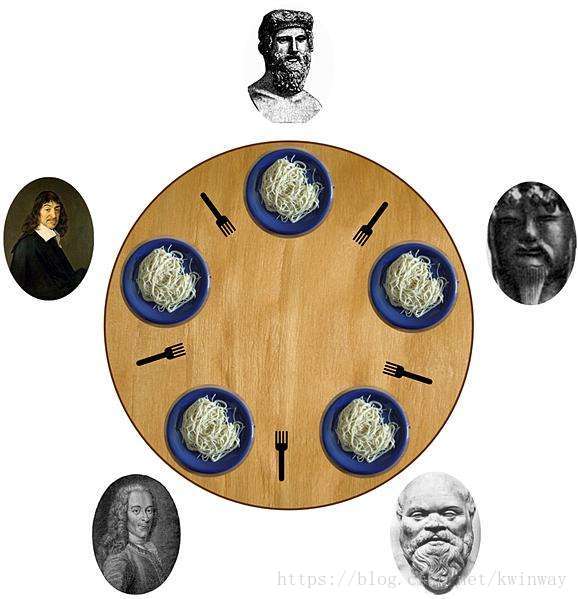第三十二章 System V信号量(三)
n哲学家进餐问题描述有五个哲学家,他们的生活方式是交替地进行思考和进餐,n哲学家们共用一张圆桌,分别坐在周围的五张椅子上,在圆桌上有五个碗和五支筷子,n平时哲学家进行思考,饥饿时便试图取其左、右最靠近他的筷子,只有在他拿到两支筷子时才能进餐,n进餐完毕,放下筷子又继续思考。
约束条件
(1)只有拿到两只筷子时,哲学家才能吃饭。
(2)如果筷子已被别人拿走,则必须等别人吃完之后才能拿到筷子。
(3)任一哲学家在自己未拿到两只筷子吃饭前,不会放下手中拿到的筷子。

问题的产生
如果5个哲学家同时拿起了左边的筷子,
那么5个哲学家同时又会请求右手边的筷子,
由于每个哲学家都只有一个筷子,无法进餐,又连续的请求右手边没有的筷子,就会一直进入等待的状态(死锁)
这样5个哲学家就饿死了
在IPC进程通信中我们了解过,我们可以把五个哲学家想象成五个进程,而那五个筷子就是临界区的临界资源,
只有某个进程得到临界区的两个资源才能进行下去,否则会一直阻塞,那么就可以用一组 5个 信号量表示5个筷子,每个信号量的值为0或1 表示此筷子是否被使用中
#include <unistd.h>
#include <sys/types.h>
#include <stdlib.h>
#include <stdio.h>
#include <errno.h>
#include <string.h>
#include <sys/types.h>
#include <sys/wait.h>
#include <sys/ipc.h>
#include <sys/sem.h>
union semun {
int val; /* Value for SETVAL */
struct semid_ds *buf; /* Buffer for IPC_STAT, IPC_SET */
unsigned short *array; /* Array for GETALL, SETALL */
struct seminfo *__buf; /* Buffer for IPC_INFO
(Linux-specific) */
};
#define ERR_EXIT(m) \
do \
{ \
perror(m); \
exit(EXIT_FAILURE); \
} while (0)
int sem_p(int semid)
{
struct sembuf sops = {0, -1, 0};
int ret;
ret = semop(semid, &sops, 1);
if(ret == -1)
ERR_EXIT("semop");
return 0;
}
int sem_v(int semid)
{
struct sembuf sops = {0, 1, 0};
int ret;
ret = semop(semid, &sops, 1);
if(ret == -1)
ERR_EXIT("semop");
return 0;
}
#define DELAY (rand()%5 + 1)
int semid;
void wait_for_2fork(int no)
{
int left = no;
int right = (no+1)%5;
struct sembuf buf[2] = {
{left, -1, 0},
{right, -1, 0}
};
semop(semid, buf, 2);
}
void free_2fork(int no)
{
int left = no;
int right = (no+1)%5;
struct sembuf buf[2] = {
{left, 1, 0},
{right, 1, 0}
};
semop(semid, buf, 2);
}
void philosophere(int no)
{
srand(getpid());
for(;;)
{
printf("%d is thinking...\n", no);
sleep(DELAY);
printf("%d is hangry\n", no);
wait_for_2fork(no);
printf("%d is eating\n",no);
free_2fork(no);
}
}
int main(int argc, char* argv[])
{
semid = semget(IPC_PRIVATE, 5, IPC_CREAT|0666);
if(semid == -1)
ERR_EXIT("semget");
int i;
union semun su;
su.val = 1;
for(i=0; i<5; ++i)
{
semctl(semid, i, SETVAL, su);
}
int no = 0;
pid_t pid;
for(i=1; i<5; ++i)
{
pid = fork();
if(pid == -1)
ERR_EXIT("fork");
if(pid == 0)
{
no = i;
break;
}
}
philosophere(no);
return 0;
}



 浙公网安备 33010602011771号
浙公网安备 33010602011771号